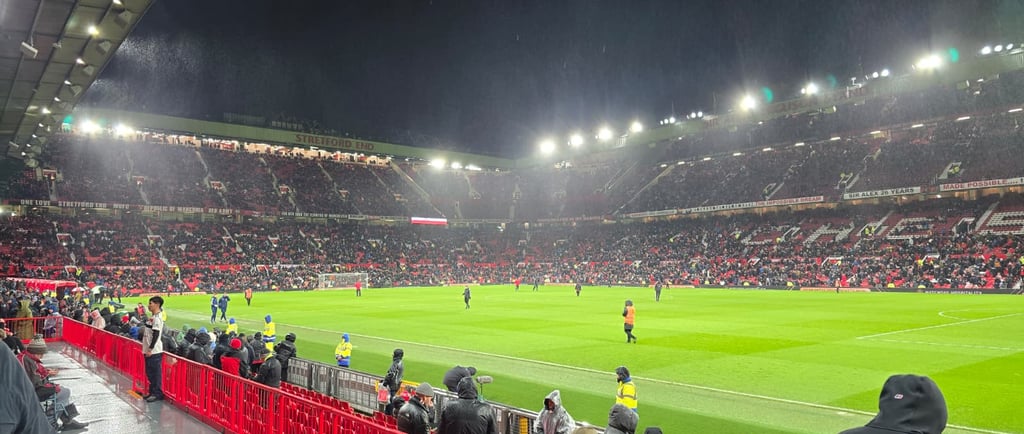City vs United: The Midfield Puzzle Amorim Can’t Solve
Manchester United’s derby defeat wasn’t just about missed chances or defensive errors - it was structural. Amorim’s refusal to solve the midfield imbalance is crippling both defence and attack, with square pegs forced into round holes. Unless he adapts quickly, United risk wasting a talented squad - and the patience of their fans.
DA
9/16/20253 min read


When you strip football down to its simplest truth, it isn’t about fancy systems or chalkboard formations. It’s about which player plays where. Managers can dress it up in 4-2-3-1s or 3-5-2s, but the real question is always: are you putting the right player in the right role and are you getting them to player together as a team?
Right now, United’s midfield is the puzzle that Amorim cannot solve.
Our defence is decent. Our attack is decent. But the midfield - the heartbeat of any side - is where the imbalance lies. The personnel are talented, but the pieces don’t fit. The consequence is that the imbalance is so significant it’s adversely impacting our defence and attack. And that is why City exposed us so brutally.
Manchester United’s defeat wasn’t just down to poor finishing or lapses at the back - it was structural. City’s strength is their ability to overload midfield areas, suffocate time on the ball, and pull players out of position. Against other sides this season, United’s midfield has scraped through. Against City, there was nowhere to hide.
Fernandes being asked to play deeper is at the centre of this issue. He’s a brilliant footballer, but not in that role. His instincts are to create, chase, and attack. They are not to sit back, dictate tempo, or defend space. Ugarte brings endeavour but not dominance. Casemiro looked the most comfortable in that position - but only when the match was already gone, perhaps with City having eased off.
The result? A midfield constantly on the back foot, exposed by City’s pressure, and unable to link defence with attack.
There’s a lazy idea in football that “if you’re good enough, you can play anywhere.” That’s nonsense. You didn’t see Alan Shearer at right-back. You didn’t see Ryan Giggs as a left-back. Players are specialists, and they learn their roles over years: the space they can use, the runs they must track, the areas they can exploit. A team only works when each piece of the puzzle is in its proper place.
Michael Carrick was an expert in his craft - sitting deep, dictating play, shielding the back four. Ferguson never asked him to be a number 10. Why? Because that wasn’t his game. Fernandes is our number 10, not our Carrick. Amorim hasn’t grasped that, and the entire balance suffers.
Contrast this with Sir Alex Ferguson, who could adapt with pragmatism when needed. Look at 28 August 2011, when United beat Arsenal 8–2 at Old Trafford. Rooney hit a hat-trick, Ashley Young scored twice, and United ran riot.
The XI that day - De Gea; Smalling, Evans, Jones, Evra; Anderson, Cleverley; Young, Nani; Rooney, Welbeck - wasn’t full of Galácticos. But it worked because every player was in a role that suited them. Young and Nani stretched the game, Rooney linked and finished, Anderson and Cleverley kept midfield ticking and kept things tight. Ferguson didn’t force square pegs into round holes unless he had to for a game or two. He adapted to what he had, and the result was extraordinary.
That is the mark of a great manager: buying players to suit a philosophy, yes, but also being pragmatic when the squad demands it.
Amorim has had nearly a year. He’s had two transfer windows, pre-seasons, time to test ideas. Yet the basics - picking the right players in the right roles - still aren’t there. Whatever the politics of transfers or budgets, those are secondary. He is the manager. The responsibility is his. He doesn’t have to play the midfield he is – it’s his choice. Worse, despite having the worst premier league record of any manager in the past 12 months, he refuses to budge.
United fans are known for their loyalty, and rightly so. But the loyalty must always be to Manchester United Football Club, not simply to the man in the dugout. Managers earn that loyalty by showing they can get the best out of the squad. If we reach a stage where the manager is not doing that - and Amorim is perilously close - then he needs to be told. He needs to realise this.
That is why his post-match comments are so troubling. To brush off the situation, to speak as though nothing urgent needs fixing, is to misread the gravity of where he stands. Change has to come in discipline, in approach, in selection - or the board will be forced to act for the good of the club.
And let’s be clear: this isn’t the same problem we’ve had in the past. In fairness to INEOS, we do now have a good squad. Not a perfect one, not the best in the league, but one good enough to be challenging for Europe. To waste that with muddled tactics and square pegs in round holes is unacceptable.
There’s no doubt that plenty of managers out there could get a better tune out of this squad than Amorim is right now. Which makes the choice simple: Amorim either wakes up and adapts, or he will inevitably force the club’s hand.
Because this club deserves better. The fans of Manchester United deserve better.
Community
Connecting fans worldwide, celebrating heritage and values.
Contact
info@mumsc.org
© 2025. All rights reserved.
Powered by IT CORE SERVICES LTD
